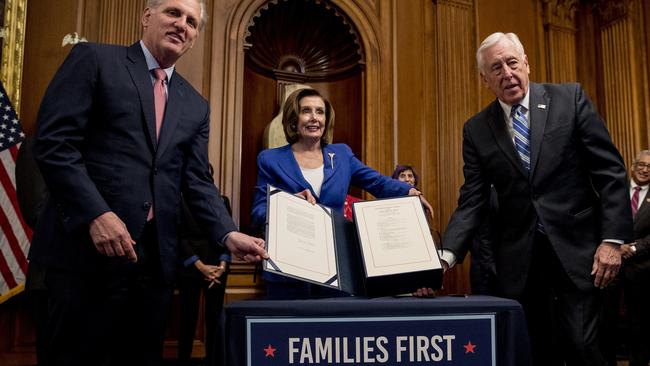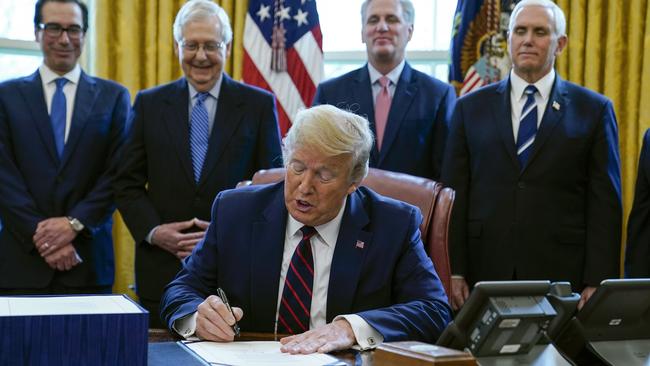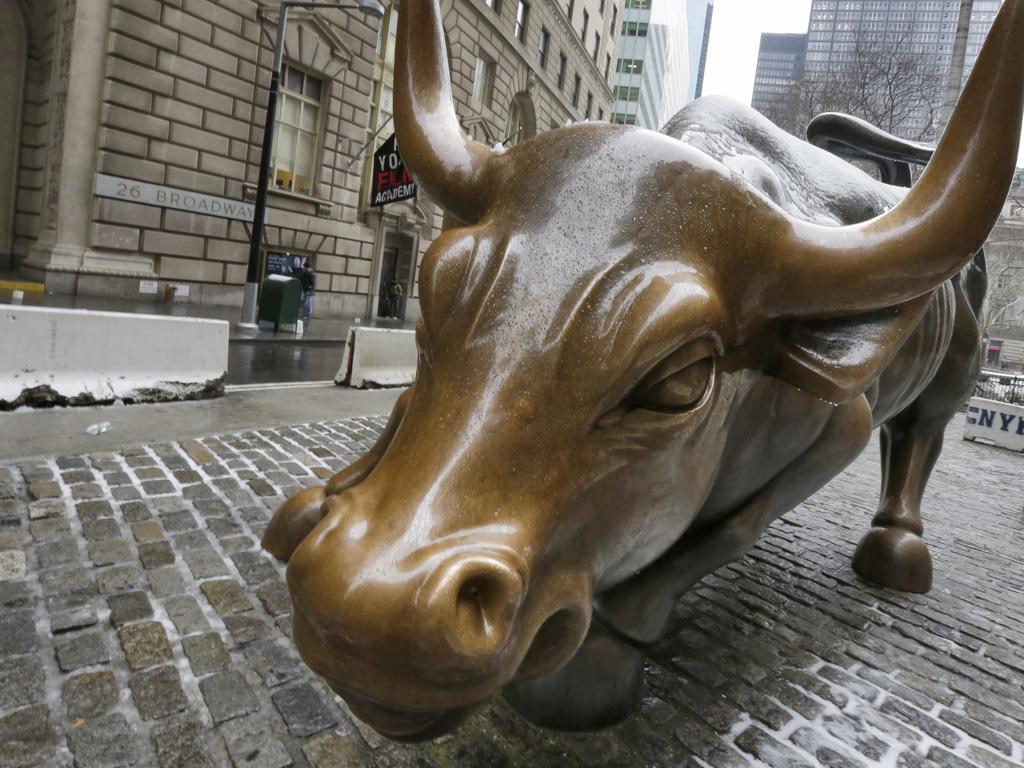Wall Street snaps winning streak but posts weekly gains on virus aid
US stocks plunged after three positive sessions despite passage of a huge stimulus package, but indexes still posted weekly gains.

US stocks fell Friday, but hung on to strong weekly gains as lawmakers sent President Donald Trump the largest economic-relief package in US history in response to the coronavirus pandemic.
Investors have been on a rollercoaster ride as attempts to curb the coronavirus pandemic constrain economic activity.
Despite a daily decline Friday, the Dow Jones Industrial Average posted a weekly gain of about 12 per cent -- its best week since 1938.
The Dow Jones Industrial Average sank 4.1 per cent, or 915 points, to 21,636.78. The broadbased S&P 500 dropped 3.4 per cent to 2,541.47, while the tech-rich Nasdaq Composite Index tumbled 3.8 per cent to 7,502.38.
The S&P 500 and the Nasdaq Composite both posted weekly gains of at least 10 per cent.
On Thursday the Dow capped a furious three-day rally that pushed the blue-chip index into a new bull market. That follows two weeks of double-digit declines, one of which was the worst since October 2008.
In other key developments overnight:
* In Australia, a late plunge wiped earlier gains on the ASX. SPI futures were largely flat on Saturday morning.
* The Aussie dollar was higher at US61.65c.
* European markets retreated as investors banked profits, with London down 5.5 per cent, Frankfurt losing 3.7 per cent and Paris down 4.2 per cent.
* Oil prices slumped anew, with Brent North Sea crude falling 7.3 per cent to plumb a 17-year low, owing to massive oversupply as the coronavirus crisis paralyses global demand.
* The European Central Bank asked eurozone banks not to pay dividends “until at least October 2020” to preserve liquidity.
In the US, investors waiting for government spending measures to help cushion the economic damage of the coronavirus pandemic watched as the House passed a $US2 trillion stimulus package by a voice vote Friday afternoon, before it was signed by Mr Trump.
The bill, which passed the Senate late Wednesday, is the largest economic-relief package in history and would extend aid to many Americans through direct payments and expanded unemployment insurance. A record 3.28 million US workers applied for unemployment benefits last week, nearly five times the previous record high.

Earlier in the week, the Federal Reserve signalled a wide-ranging effort to help the US economy by extending loans and purchasing hundreds of billions of dollars in government debt.
“What the market is saying is earnings are going to be really bad in the near term, economic growth is going to be really bad in the near term, but with this kind of a stimulus I can see that a recovery will happen at some point later this year potentially,” said Mike Wilson, chief US equity strategist and chief investment officer for Morgan Stanley.
Despite the week’s gains for stocks, there were signs that investors remain cautious.
Gold, a traditional safe haven, posted its largest one-week percentage gain since September 2008.
The US overtook China this week as the country with the most coronavirus cases with 85,991 confirmed infections, while fatalities topped 1,296. Hospitals in the New York metro area and Seattle have been overwhelmed despite stringent measures to curtail the contagion.
Adding to concerns about how long the pandemic may damp economic activity, China said Thursday it would close its borders to nearly all foreigners and drastically slash international flights in a bid to curb the reintroduction of the virus from abroad.
“Underlying all this is how do we get this virus under control,” said Neil Hennessy, chief investment officer of Hennessy Funds. “Once we have it under control or it peaks, subsides, whatever, then the market will be back on its legs.”
The spread of the virus -- and the economic fallout from measures put in place to halt the outbreak -- has fuelled debate on whether the US needs to continue enforcing a strict lockdown that is eroding business activity and output. The Trump administration is planning to issue guidelines aimed at helping state and local authorities decide whether to tighten or relax measures designed to help slow infections.
Investors and business leaders remain concerned that emergency measures by the Federal Reserve and US lawmakers, including the stimulus package, may not prevent a sharp US recession that could have global consequences.
“What we’re trying to do is put the economy on ice and sow the seeds of a strong rebound as soon as the crisis is over, recouping as much economic ground as possible,” said Richard McGuire, head of rates strategy at Rabobank. “It’s a volatile environment where we will, within that context, see repeated bold policy responses, but they are pushing on an open door.”
The Cboe Volatility Index, a closely watched measure of turbulence in US stocks, was on pace to finish the week lower after rising for five consecutive weeks, though it remained elevated. Many investors expect the recent volatility in the markets to persist.
“I think this will continue for some time,” said Nancy Tengler, chief investment officer at Laffer Tengler Investments. “The news is going to be spotty and investors have been scrambling.”
Oil prices declined after the US Department of Energy suspended the purchase of 30 million barrels of crude oil it was going to add to its Strategic Petroleum Reserve. The meeting of G-20 leaders also disappointed some traders after it failed to produce any statement that related to oil or the price war raging between Saudi Arabia and Russia. US crude declined 4.9 per cent for the week to $US21.51 a barrel.
In Asia, most major markets drifted higher by the close of trading. Japan’s Nikkei 225 was the best performer, rising 3.9 per cent to end what was the gauge’s best week in its 70-year history.
Dow Jones Newswires





To join the conversation, please log in. Don't have an account? Register
Join the conversation, you are commenting as Logout